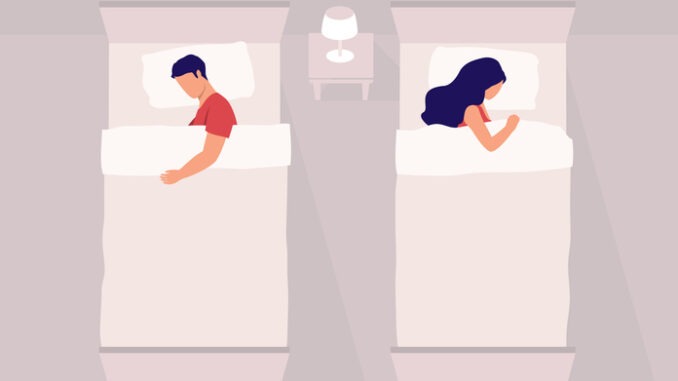
As temperatures soar during summer heatwaves, many find themselves grappling with disrupted sleep patterns. For couples sharing a bed, the added body heat can exacerbate discomfort, making it challenging to achieve a restful night’s sleep. This predicament has led some to consider a rather unconventional solution: the ‘sleep divorce’
CREDIT: This is an edited version of an article that originally appeared on The Independent
The concept of a sleep divorce involves couples sleeping in separate beds or rooms to improve sleep quality. While it may initially seem counterintuitive to relationship dynamics, proponents argue that it can actually enhance both individual well-being and the overall health of the relationship.
Understanding heat’s impact on sleep
Carolina Goncalves, a superintendent pharmacist at Pharmica, explains that the human body naturally cools down during sleep to facilitate the sleep process. However, when ambient temperatures rise, this cooling mechanism can be compromised. As a result, individuals may experience more frequent awakenings and lighter sleep states, unable to achieve the restorative deep sleep needed for optimal health.
Alison Cullen, a sleep expert from avogel.co.uk, points out that sharing body heat, while comforting in colder climates, becomes a hindrance in hot weather. The additional warmth can further disrupt sleep, leaving both partners feeling restless and fatigued come morning.
Benefits of sleeping apart
Opting for a sleep divorce allows couples to regain control over their sleep environment. This includes setting room temperature preferences, choosing suitable bedding, and eliminating disturbances caused by a partner’s movements or snoring. Improved sleep quality not only leads to feeling more rested but also contributes to better overall health outcomes, such as reduced aches, fewer cravings, and increased daytime energy levels.
Cullen suggests that the benefits extend beyond physical comfort to emotional and relational well-being. Feeling well-rested and rejuvenated can foster a more positive mood and outlook, reducing potential conflicts arising from sleep deprivation.
In certain cultures, sleeping in separate beds or rooms is more commonplace, particularly in Nordic countries like Scandinavia. Besides heat-related issues, reasons for considering a sleep divorce may include differing sleep schedules, health conditions that disrupt sleep, or the need for personal space.
Goncalves highlights that sleeping separately can also lead to a deeper appreciation of shared intimacy when together, potentially enhancing relationship satisfaction and emotional connection between partners.
Practical tips for cool sleep
For those considering alternative sleeping arrangements during heatwaves, experts recommend several practical tips:
- Choice of bed linen: Opt for breathable materials like cotton to help wick away moisture and keep cool.
- Bedding selection: Use lightweight, low tog duvets and consider cooling mattress toppers to improve airflow and comfort.
- Home environment: Keep curtains and blinds closed during the day to prevent heat buildup indoors, while ensuring internal doors remain open to facilitate air circulation.
While the idea of a sleep divorce may initially raise eyebrows, especially in cultures where sleeping together is seen as a symbol of intimacy, its potential benefits in alleviating heat-induced sleep problems and enhancing overall well-being are worth considering. By prioritising quality sleep, individuals can not only improve their health but also nurture stronger, more resilient relationships.



Be the first to comment